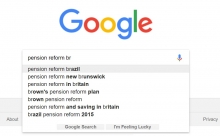Brazilian government wants Google's help to approve the pension reform

The communication team of Brazilian President Michel Temer met with Google representatives on January 11 to discuss a partnership proposal on pension reform. According to the newspaper "O Globo", the search website would direct the user who search the matter to the official content of the government. In addition, the results of the search would take into account the profile of that user.
"It would work more or less like this: a rural worker who placed the term 'pension reform' in the search mechanism would receive the content that explains, for example, that this category will not be affected by the changes", explains the "O Globo" article.
According to the newspaper, the government is especially interested in YouTube. That is, it aims to reach the young audience.
Michel Temer is the president of Brazil since the impeachment of former president Dilma Rousseff – a process that was considered an institutional coup d'état by a large part of Brazilian society. Since then, he has been executing radically neoliberal policies. His proposed pension reform, which removes rights acquired by Brazilian workers, is opposed by 66% of the population, according to an opinion poll released on January 6.
"The proposal for the dismantling of Social Security undertaken by the government, improperly called "reform", is nothing more than an income transfer in reverse, because it withdraws from the poorest to increase the available capital for private pension funds administered by the banking institutions and for the payment of interest on the public debt that the government refuses to audit", says Francelino Valença, Director of Trade Union Training and Inter-Union Relations of the National Federation of the State and District Treasury (FENAFISCO), affiliated with the Public Services International (PSI).
On the possible association between the government and Google, Valença says that the objective is to convince the population, with the use of "sophisms", that the "pseudo-reform" is necessary and indispensable.
"It was not enough to use millions of reais, public money that should be used to combat poverty and promote social development, in media campaigns! The government tries, in its last breath, to promote an association with a private company to suppress the most in need of the increasingly distant dream of retirement by imposing a minimum age of 65 for men and 62 for women, although in some regions of Brazil the expectation is below 50!", he protests.
The news of partnership between government and Google has also been receiving criticism from experts in communication and government transparency. The journalist Fabiano Angélico, specialist in transparency and teacher in Public Administration and Government, believes that using public money in communication can only be acceptable to inform society about social actions and/or public interest, mainly in cases where an action by the population is awaited, such as vaccination campaigns or registration of biometrics for elections.
"It makes sense to use the taxpayer's money to keep him informed about some concrete fact and about which there are no controversies and to encourage him to take an concret attitude (go to the electoral office or go to the health post). To inform about a fact is different from inform about a version. The pension reform is not consensual, so publicizing the Executive's proposal is to publicize a version, not a fact", he says.
"Secondly, using personal information for this type of action is an abusive act that violates the right to the protection of personal data. It is time for companies such as Google (and Facebook), private actors with enormous power in the public space, to position themselves more firmly in the sense of not accepting to share abusively, mainly with political and economic power, the enormous masses of personal data that they hold."
In an article published on January 16, journalist Marina Pita, coordinator of Intervozes, a collective that fights for the right to communicate, wrote:
"Although the official publicity about the pension reform is abusive and illegal, the new move, to personalize online searches according to the profile of the citizen, can be even more serious: it not only directs advertising produced for manipulation and not the information (...) but still hides content with different points of view, relegating them to the bottom position in the search results. It is an affront to the right of access to information and freedom of expression, as only informed citizens can express free and conscious opinion."
She recalls that the federal government has spent a lot of money with advertising in relation to pension reform – in times of freezing of public spending – and that there have been lawsuits over its content, considered more propaganda of the government's vision than of information to the citizens.

